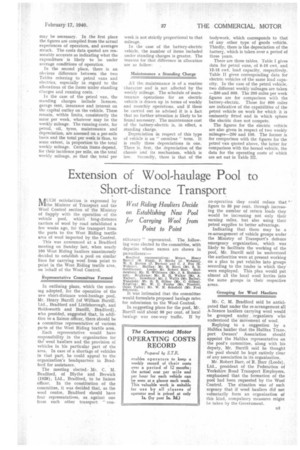Extension of Wool-haulage Pool to Short-distance Transport
Page 29

If you've noticed an error in this article please click here to report it so we can fix it.
West Riding Hauliers Decide on Establishing New Pool for Carrying Wool from Point to Point
AUCH satisfaction is expressed by LVIthe Minister of Transport and the Wool Control section of the Ministry of Supply with the operation of the vehicle pool, which long-distance carriers of wool by road established a few weeks ago, for the transport from the ports to the West Riding textile area of wool imported by the Control.
• This was announced at a Bradford meeting on Sunday last, when nearly 100 West Riding hauliers unanimously decided to establish a pool on similar lines for carrying wool from point to point in the West Riding textile area, on behalf of the Wool Control.
Representative Committee Formed
In outlining plans, which the meeting adopted, for the operation of the new short-distance wool-haulage pool, Mr. Henry Burrill (of William Burrill, Ltd., Bradford and Littleborough, and Holdsworth and Burrill, Bradford), who presided, suggested that, in addition to a liaison officer, there should be a committee representative of various parts of the West Riding textile area.
Each representative would have responsibility in the organization for thd wool hauliers and the provision of vehicles in his particular part of the area. In case of a shortage of vehicles in that part, he could appeal to the organization's headquarters in Bradford for assistance.
The meeting elected Mr. C. M. Bradford, of Blythe and Berwick (1928), Ltd., Bradford, to be liaison officer. In the constitution of the committee, it was decided that, as the wool centre, Bradford should have four representatives, as against one from each other transport " con
stituency " represented. The following were elected to the committee, with deputies whose names are shown in parentheses:—
Bradford representatives: Messrs. Henry Burrill (M. F(eld), E. Blythe (J. websted, W. a. Burton (3. Burton) and C. J. Fox (E. Webster). Halifax: Mr. H. Short, (Mr. S. D. Goldthorpe). Leeds: Mr. Hobert Barr. Huddersfield: Mr. H. •Wilkinson (Mr. J. S. Hutehin
Briponse: Mr. H. H. Walker tr. A. Walker). owsbury: Mr. J. Wallis (Mr. alley). Wakefield: Mr. G. E. Gilbey (Mr. C. Gilbey). Kcighley: Mr. W. C. Forder (Mr. Proctor). Coine Valley: Mr. W. H. Schofield (Mr. Fred Schofield).
It was intimated that the committee would formulate proposed haulage rates for submission to the Wool Control.
In suggesting plans for the pool, Mr. Burrill said about 90 per cent. of local haulage was one-way traffic. If by
co-operation they could reduce that • • figure to 50 per cent, through increasing the number of return loads they would be increasing not only their earning miles, but also using their petrol supplies to better advantage.
Indicating that there may be a re-arrangement of vehicle groups under the Ministry of Transport's defence emergency organization, which was likely to facilitate the working of the pool, Mr. Burrill said he understood the authorities were at present working on a plan to put vehicles into groups according to the trades in which they were employed. This plan would put almost all the local wool lorries into the same groups in their respective areas,
Grouping for Wool Hauliers
Mr. C. M. Bradford said he anticipated that under the re-arrangement all A-licence hauliers carrying wool would be grouped under organizers who understood the movement of wool.
Replying to a suggestion by a Halifax haulier that the Halifax Transport Owners' Association should appoint the Halifax representative on the pool's committee, along with his deputy, Mr. Burrill said he thought the pool should be kept entirely clear of any association in its organization.
Mr. Robert Barr, of R. Barr (Leeds), Ltd., president of the Federation of Yorkshire Road Transport Employers, emphasized that the formation of the pool had been requested by the Wool Control. The situation was of such urgency that if wool hauliers did not voluntarily form an organization of this kind, compulsory measures might be taken by the Government.




























































